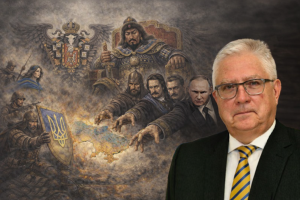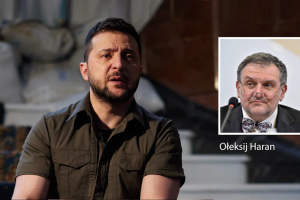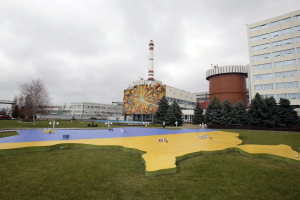This policy brief was prepared exclusively for "Rubryka"
International Developments
- russia formally took chairmanship in the UN Security Council in April.
The rotation-based chairmanship mechanism of the UN Security Council led to russia's formal heading of the institution in April.
russia would likely exploit the moment to:
- persuade more neutral nations to support the russian invasion of Ukraine by promising them to bring their agenda to the UN SC;
- solidify its coalition with China by supporting and promoting Beijing's "peace plan" on Ukraine;
- accelerate aggressive anti-Ukrainian and anti-Western propaganda from the UN SC institutional level.
- russia presented its new foreign policy concept.
On 31 March, the russian national security council formally approved the new editions of the foreign policy concept.
The document fully complies with the russian aggressive foreign policy and the military stance taken in recent years. It officially formalizes the kremlin's views of the West and the United States as a "major source of risks for the national security and international peace". It sets a formal course towards "eliminating the rudimentary US world domination".
China and India are designated as russia's main strategic allies, as the concept envisions "deepening bilateral relations and coordination" with both countries.
The concept also utilizes the term "close proximity territories" ("Blizhneye zarubiezhye") for the post-Soviet countries neighboring russia, with an accent on "turning the region into the zone of peace, good-neighborliness and prosperity".
- On 2 April, an improvised explosive device killed a russian propagandist and "war correspondent" Maksim Fomin, aka "Vladlen Tatarskiy".
The incident happened during Fomin's meeting with his audience in St.Petersburg, in the "Street Food Cafe" owned by PMC Wagner's Prigozhin. Allegedly, Fomin received IED masked as a decorative bust from Daria Trepova, a young russian woman, who was arrested on 3 April. According to russian official sources, Trepova has ties with russia's Navalny Anti-Corruption Foundation, and the Ukrainian intelligence services plotted the murder. However, Fomin's employer, Yevgeniy Prigozhyn connected the incident to "certain domestic radical forces".
- putin's regime arrested the Wall Street Journal reporter, US citizen Evan Gershkovich for "espionage".
President Biden condemned Gershkovich's arrest and demanded to free him. The White House officially asked all US citizens to leave russian territory as soon as possible.
Secretary of State Blinken had a phone call with his russian counterpart, Lavrov, concerning the incident.
The arrest came not long after US authorities arrested russian national Sergey Cherkasov, charging him last week in a US District Court in Washington, DC, with acting as an agent of a foreign power, visa fraud, bank fraud, wire fraud and other charges stemming from his alleged illegal activities in the US, according to the Justice Department.
russian FSB's move on Gershkovich represents a pattern used by the russian security apparatus to carefully pick US citizens as hostages for future prisoners swaps with the United States to get russian intelligence operatives and/or agents out.
One of the recent cases involved the arrest of American basketball player Brittney Griner. She had been detained in russia on the brink of russian invasion of Ukraine in February 2022 on minor charges of drug smuggling and possession. In December 2022, she was released in exchange for russian arms-trafficker Viktor Bout, convicted in the United States.
- The European Union plans to launch a project to identify gaps in the sanctions regime against russia.
The project would involve nine member states: the Czech Republic, Cyprus, Denmark, Hungary, Lithuania, Malta, Romania, Slovenia and Spain. It is aimed at improving coordination between national authorities when enforcing penalties.
The new initiative would also actively exploit the partnership between the European Commission and the national governments. It can be a precursor to the new EU mechanism to coordinate sanctions oversight.
The project will run for two years, starting around June 2023. It is expected to map the authorities in charge of asset freezes, exchange good practices and improve their implementation.
- British Defense Minister Ben Wallace stressed the need for additional training of the Ukrainian military in expectation of a major counteroffensive.
As one of the major military aid contributors to Ukraine, Great Britain has provided Ukrainian Armed Forces with 14 Challenger 2 main battle tanks. They are set to operate alongside German Marder infantry fighting vehicles within a brigade or a battlegroup being assembled to combine different weapons to break through russian defenses.
At the same time, Ukrainian military leadership needs to exercise and train in fighting in the brigade or a battlegroup-level fight in the NATO manner, according to the Minister.
War/Security Situation
- russian military seems to lose the tempo of its offensive on the Eastern front.
Dramatic losses of personnel and equipment and the apparent inability to replenish them gradually slows down russian assault operations. The Wagner PMC group and russian regular forces are suffering from the lack of artillery ammo, weaponry and manpower.
russian political and military leadership is actively issuing statements on plans to triple ammo and weapons production rates. However, in the short-term, the situation will further deteriorate, forcing the russian military either to seek other approaches to conduct operations or to gradually turn to a more defensive posture not only on the Southern but also on the Eastern front.
Conclusions and Recommendations
- russia will use chairmanship in the UN Security Council in April to bring all of its hybrid toolkit in an attempt to solidify its international position and possibly gather additional minor allies. Ukrainian diplomacy should do its best to mitigate this risk. It is necessary:
(1) reveal russian true aggressive intentions and methods;
(2) block all russian anti-Ukrainian and anti-Western initiatives fought to the UN SC;
(3) insist on russian illegal status in the United Nations Organization in general, in its Security Council in particular;
(4) call for the UN and UN SC reforms.
- russian new foreign policy concept formalized russian aggressive foreign policy toward immediate neighbors and the West in general. It aims at establishing a global anti-Western coalition based on strategic partnership with China and India.
Likely, russian leadership will actively exploit the concept during the nation's month-long chairmanship in the UN Security Council in April.
Ukraine has to stress further that the new concept is but another hybrid and propaganda tool used by the russian regime to continue its confrontation with the West.
- So far, DIF sees three most likely versions of the Fomin-"Tatarskii" IED assassination taking into consideration all available information.
(1) Fomin-"Tatarskii" was killed to draw public attention from russia's dire situation on the Eastern front in Ukraine to strengthen pro-Kremlin and pro-war perceptions among the russian population.
(2) The killing is a clear message to Girkin-"Strelkov" and his associates (who announced the foundation of the informal "angry patriots" group) and Prigozhyn himself (who took too much publicity with the Bakhmut situation): do not stray too far from the kremlin.
(3) The killing is a tool to tighten control over the domestic situation further, crash on Navalny's remaining associates and other political opposition, and, if needed, turn the incident against the West in general and the United States in particular, with the recent arrest of the WSJ reporter who was investigating Navalny's ACF activities in Russian regions.
Ukraine and the West should closely observe these developments as they surely map the future domestic landscape of putin's regime.
- putin's regime arrest of the Wall Street Journal reporter, a US citizen Evan Gershkovich for "conducting espionage" is another hybrid tool the kremlin is actively using against Western nations.
It allows Moscow
(1) fabricate propaganda stories of "hostile intelligence and subversive operations" constantly carried out by Western countries on russian soil and against russian interests;
(2) support russia's own intelligence/subversive operations abroad, ensuring their operatives/agents safe extraction through prisoners' swaps;
(3) maintain pressure on Western political leadership and societies by creating additional concerns and threats for their citizens.
russian hybrid terrorist-like tactics are the same both in Ukraine and against other Western nations – a fact Kyiv has to stress and offer assistance in developing common approaches to counter it on all possible levels systematically.
- The European Union's initiative to identify gaps in the sanctions regime against russia will increase economic and political pressure on putin's regime.
Ukraine could be a valuable partner in the project through (1) supporting the EU bodies, and the project member states with substantial evidence of russian efforts to avoid sanctions in various areas, from the military industrial complex to transportation, logistics and so on; and (2) taking part in joint investigations and assist in the practical implementation of their results.
- British Defense Minister Ben Wallace stressed the need for additional training of the Ukrainian military in the wake of the major counteroffensive.
Future Ukrainian victory lies not only in systematic weapon supplies by Western allies but the Ukrainian military's ability to handle Western-made weapon systems in combat. The key to the win – and, eventually, to the successful transformation of the Ukrainian military, is to learn to plan and conduct strategic operations utilizing forces armed with Western weapons systems and organized according to the Western military tradition. This crucial competency is yet to be developed by the Ukrainian military, and the Western allies are eager to assist in it.
Ukraine has to train its senior military leadership as soon as possible to ensure its victory in the coming major counteroffensive and eventually in the war.
- russian military seems to lose the tempo of its offensive on the Eastern front. The lack of ammo, weapons and manpower is not expected to improve in the near future, as russia seems to waste most of its reserves on futile attempts to breach Ukrainian defenses on the critical sectors of the Eastern front (Bakhmut, Vuhledar, Avdiivka).
The situation proves right the strategic calculations made by Ukrainian military leadership to thwart russian winter offensive by forcing russian generals to use their main reserves in an attempt to push through on the East while denying their ability to assemble an assault force capable of conducting hybrid offensive operations on the Southern front. This marks another step in preparations for the coming major Ukrainian counteroffensive.
______________________________________
This policy brief was prepared exclusively for "Rubryka" as part of a project "russia-Ukraine Conflict: from Full-Scale War to Conflict Resolution and Post-War Reconstruction" implemented in cooperation with the Razumkov Centre with the support of the MATRA program of the Embassy of the Netherlands. The opinions expressed are those of the author(s) only and should not be considered as representative of the Embassy's official position.








